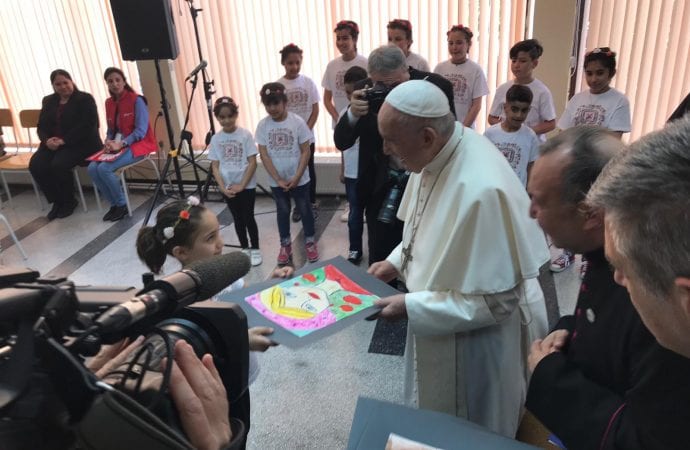On his second day in Bulgaria, Pope Francis made an early morning visit to a refugee center, thanking children and families for their joy despite the pain of leaving their homes and the difficulties of integrating into another culture.
Welcomed by songs from children as he arrived at the Vrazhdebna refugee center, Francis was shown around the facility before taking time to individually greet the 50 migrants and refugees, as well as a number of volunteers from the pontifical Caritas charity organization.
In off-the-cuff remarks, the pope said migration is a painful path, and that “it’s not easy to leave your land and to insert yourself into another land.”
“Today, the experience of migrants and refugees is a bit of a cross, a cross for humanity, and the cross of so many people who suffer,” he said, thanking the children and families for their “joy” and goodwill in walking this “painful path,” often arriving in countries where they face even more difficulty.
He closed his brief remarks by asking for prayer, and then he was given drawings from the children who live at the center, which currently houses some 20-25 families.
Opened in September 2013, the “camp” is an abandoned school that was repurposed to house migrants and refugees on their way to other countries around Europe. It was closed briefly in November 2018 for renovations to get it up to the standards of the European Union and was reopened about two months ago.
Francis’s visit to the center is packed not just with pastoral but also political meaning, as it falls the day after he had a private audience with Bulgarian Prime Minister Boyko Borisov, whose center-right coalition government includes three nationalist, anti-migrant parties.
Bulgaria for a time was a major entry point for illegal immigration into the European Union. However, they shut their border with Turkey in a bid to shut down the Balkan route into the EU.
Anti-immigration sentiments have spread throughout Europe since the crisis exploded in 2015, and it is coming into the spotlight again with the upcoming May 23-26 European Parliament elections, with polls showing broad support for anti-immigrant candidates.
After his meeting with Borisov, Francis, who has long advocated for the rights of migrants and refugees, gave a public speech to government authorities urging them to be a “bridge” between cultures, including with migrants.
In comments to journalists at the center during the pope’s May 6 visit, an Iraqi refugee from Mosul named Soad, who has lived in Bulgaria for three years with her seven children and ailing husband, said she hopes the pope’s visit leads to some sort of change.
At the center, “they help me with everything and everything is perfect,” she said, though she confessed that it has been difficult being away from her country and trying to raise seven children as a refugee.
“We hope everything will be fine because of this visit…I hope for this visit that something will change for our cities in Iraq,” she said, and referring to Francis, added, “we know he can do everything and change everything because he is helping everyone, especially refugees, and I hope (he can) change our situation a little bit for Iraqis.”
Looking to the future, Soad said she doesn’t want anything for herself, but she wants a good future for her children. Her children, she said, are no longer afraid when they see violence or something frightening, “because they saw too many things in Iraq.”
She said she has felt welcomed in Bulgaria, but there have been some problems with the government. Yet despite the struggles, “I will stay here and do everything here, but what I want from the Bulgarian government is to make my future good for my children,” who she said already feel Bulgarian and consider themselves citizens.
Taha Saver Ismael, 42, an Iraqi Kurd from Mosul, prepared a letter for the pope in English asking for help for his family, who have been in Bulgaria for three years.
Speaking with journalists, Caritas volunteer Bewar Myca said the organization runs a program at the center in partnership with UNICEF called “We play and learn,” which offers activities including (language lessons, sports, dance and art to children aged 1-18.
The camp is open and refugees staying there are able to come and go freely although they are not allowed to go near the border.
While the families who pass through the center have many needs, most come from countries with war and problems, so their greatest need, Myca said, especially for the children, is “to live in peace.”

